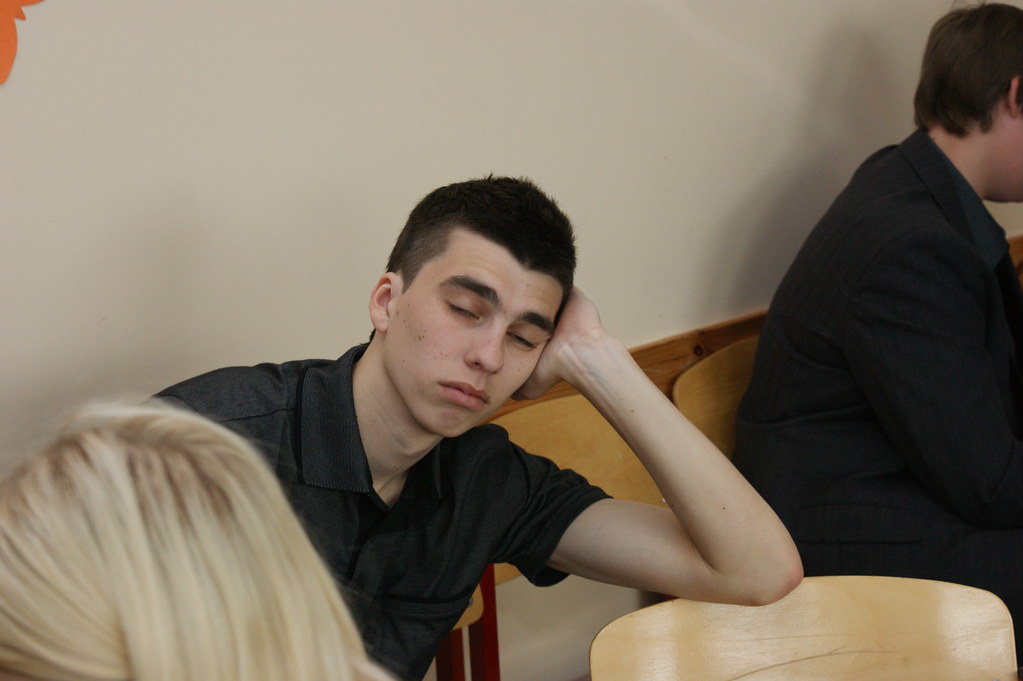3.3: Two-verb constructions
- Page ID
- 44540
When you have two verbs that are directly linked to one another in the same phrase*, the first verb will be conjugated and the second verb will remain in the infinitive.
A good pointer is that if you want to say “To _(action)_,” leave the verb in the infinitive.

|
1st verb conjugated |
2nd verb remains in the infinitive |
|---|---|
| You need | To study |
| Necesitas | estudiar |
| He wants | To travel |
| Quiere | viajar |
| I like | To cook |
| Me gusta | cocinar |
If your verbs are not directly linked, conjugate each action.
Mi esposo trabaja y estudia.
When your sentence takes a turn with a conjunction (connector word) and you initiate a new phrase, you will need to conjugate the first verb again. Watch out for signs you are starting a new phrase like:
Porque—because
Yo necesito estudiar mucho porque quiero sacar buenas notas.
Cuando—when
Mis estudiantes necesitan estudiar mucho cuando tienen un examen.
Y—and
Juana canta y baila en un grupo folklórico.
Pero—but
Yo quiero viajar a México, pero no tengo suficiente dinero.
*This is true when the subject (do-er of the action) is the same person. We have a different mood (the subjunctive) when there is a change in subject, which we will see later.
(this shouldn't be here)
Actividad 5
Mis preferencias. Answer the following questions about what you like and don’t like to do. Then, use the questions provided to interview a classmate. Lastly, answer the questions about what things you like or dislike that you have in common.
Paso uno: Check cierto or falso based on your preferences.
1. Me gusta hablar por teléfono………………...………………. ________ ________
2. Me gusta tocar la guitarra…………………………………….________ ________
3. Me gusta estudiar los sábados………………………………..________ ________
4. Me gusta mirar la televisión por la noche.…………….……..________ ________
5. Me gusta cantar en el carro.……………………………...…..________ ________
6. Me gusta hablar en público.…………………………….……..________ ________
Paso dos: Interview your partner, then check cierto or falso based on their preferences.
1. ¿Te gusta hablar por teléfono?……………………….….……..________ ________
2. ¿Te gusta tocar la guitarra?…………………………..….……..________ ________
3. ¿Te gusta estudiar los sábados?………………………….……..________ ________
4. ¿Te gusta mirar la televisión por la noche?…….……….……..________ ________
5. ¿Te gusta cantar en el carro?…………………………….……..________ ________
6. ¿Te gusta hablar en público?…………………………….……..________ ________
Paso tres: check cierto or falso based on your shared preferences.
1. Nos gusta hablar por teléfono.…………………………..……..________ ________
2. Nos gusta tocar la guitarra.…………………………….…..…..________ ________
3. Nos gusta estudiar los sábados.………………………….……..________ ________
4. Nos gusta mirar la televisión por la noche.………...…….…….________ ________
5. Nos gusta cantar en el carro.……………….…….…….……....________ ________
6. Nos gusta hablar en público.……………….…….….…….……________ ________
Actividad 6
Preguntas personales. Answer the following questions using two verbs: the first conjugated and the second in the infinitive. Audio
1. ¿Qué necesitas comprar para las clases?
________
2. ¿Qué quieres hacer (to do) esta noche (tonight)?
________
3. ¿Qué no quieres hacer esta noche?
________
4. ¿Quieres viajar a Perú algún día (someday)?
________
5. ¿Prefieres tomar café o tomar té?
________
Tener + que + infinitive
One very common expression using a conjugated verb with an infinitive is tener que infinitivo, which means “To have to ________.” Conjugate tener based on who has the obligation, insert the word que, then use the infinitive for whatever activity has to be done.
Por ejemplo:
Yo tengo que estudiar esta noche.
¿Tienes que visitar a los padres hoy?
Raúl tiene que trabajar mucho este fin de semana.


Actividad 7
¿Qué tienen que hacer los estudiantes? What do students have to do? Determine whether or not college students have to do the following activities in order to get good grades. If one of the activities is not something a student has to do, change a detail in the sentence to make it true. Be prepared to discuss your answers with a partner and as a class.
1. Los estudiantes tienen que pasar mucho tiempo en Facebook……………….…….
2. Los estudiantes tienen que ir a la biblioteca para buscar información……………...
3. Los estudiantes tienen que comprar muchos libros…………………………………
4. Los estudiantes tienen que visitar a los profesores durante sus horas de consulta….
5. Los estudiantes tienen que mirar muchas realidades en la televisión……………….
6. Los estudiantes tienen que estudiar sesenta horas por semana…………………….
7. Los estudiantes tienen que descansar los fines de semana………………………….
8. Los estudiantes tienen que cantar en la clase de español…………………………...
9. Los estudiantes tienen que escuchar a los profesores……………………………….
10. Los estudiantes tienen que tomar muchas bebidas cafeinadas……………………..


Actividad 8
¿Qué tienes que hacer? What do you have to do? Answer the following questions using the tener que infinitivo expression about your obligations. If you do not have to do something, just put “no” in front of your conjugated verb (in this case, in front of tengo). Audio Video
1. ¿Tienes que hablar en la clase de español?
________
2. ¿Tienes que trabajar esta noche?
________
3. ¿Tienes que limpiar la casa este fin de semana?
________
4. ¿Tienes que estudiar más de diez horas por semana?
________
5. ¿Tienes que comprar algo (something) en el supermercado?
________
Note: There are a couple of common expressions that use this tener que infinitivo expression.
Tengo mucho que hacer: I have a lot to do.
No tengo nada que hacer: I don’t have anything to do.
You can change your conjugation of tener to reflect “you have to” or “we have to,” etc.


Clase, hoy tenemos mucho que hacer.


